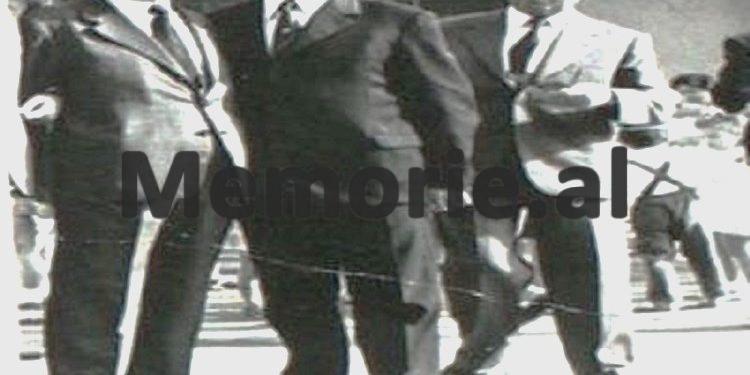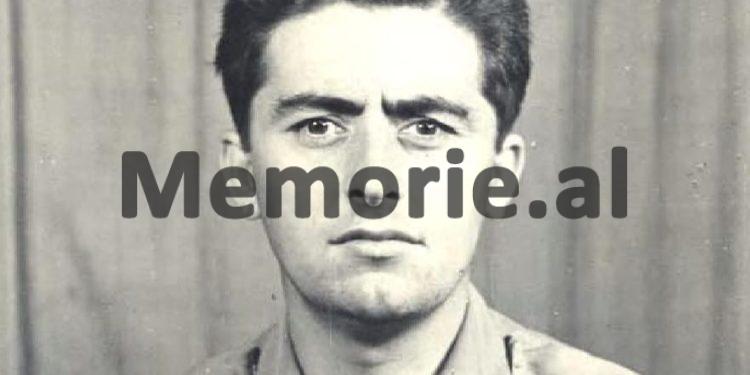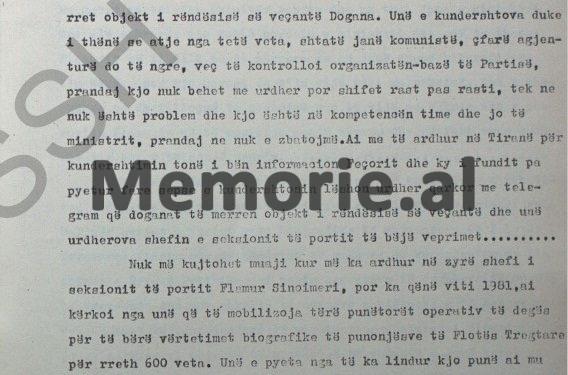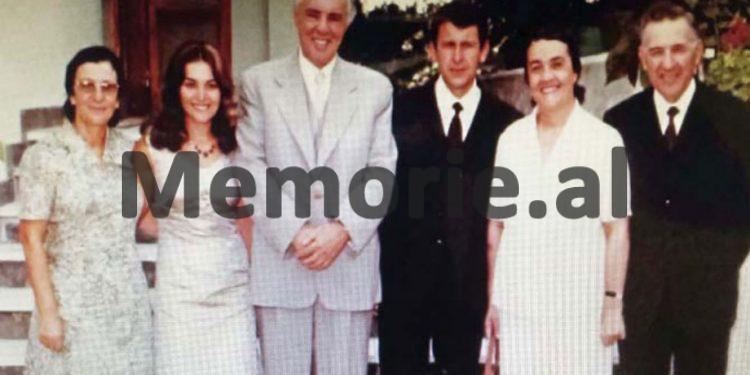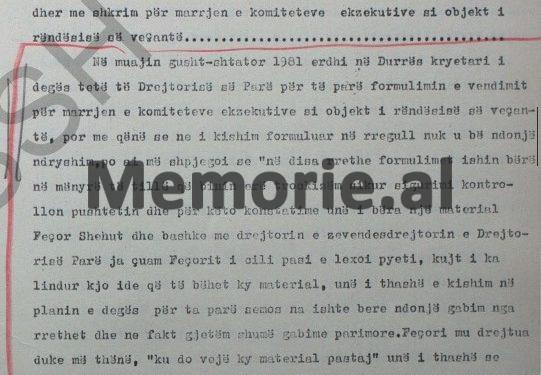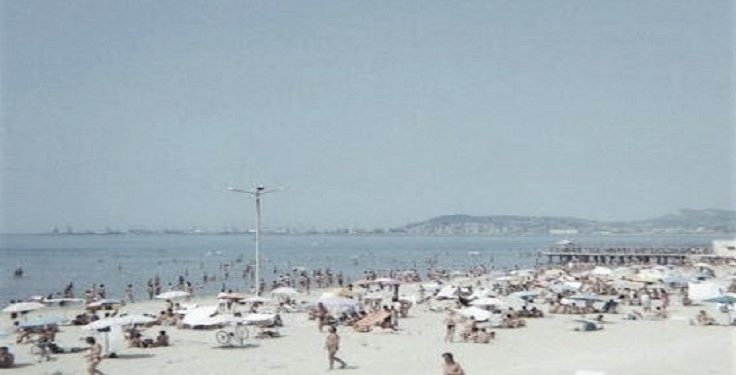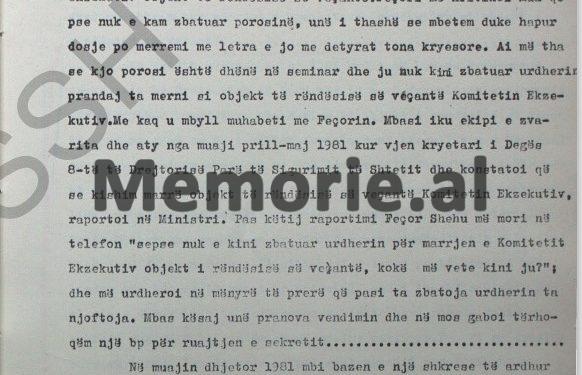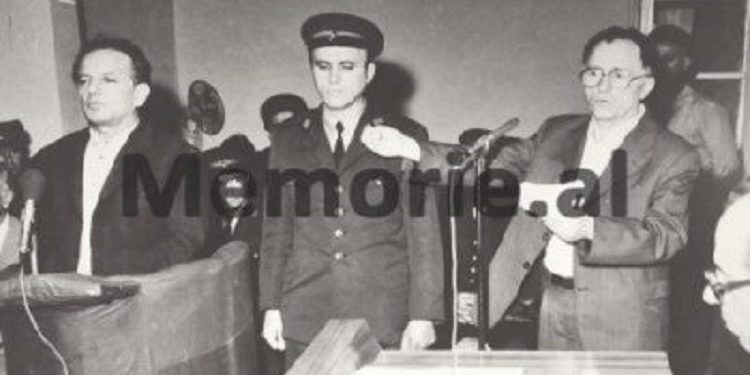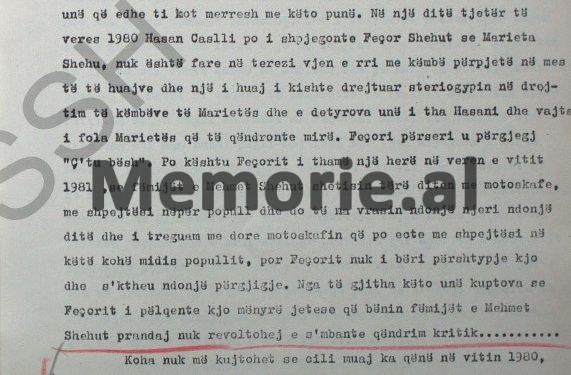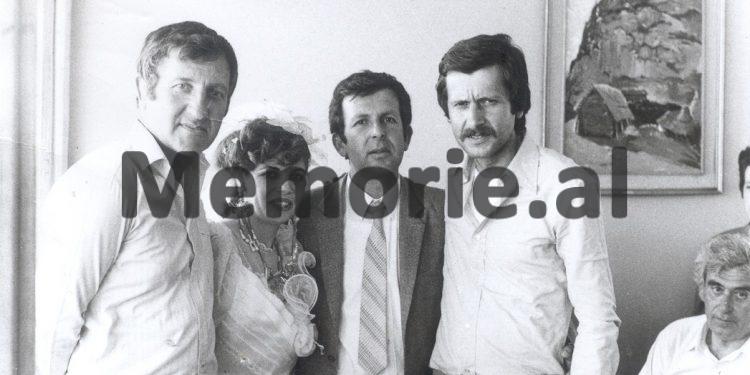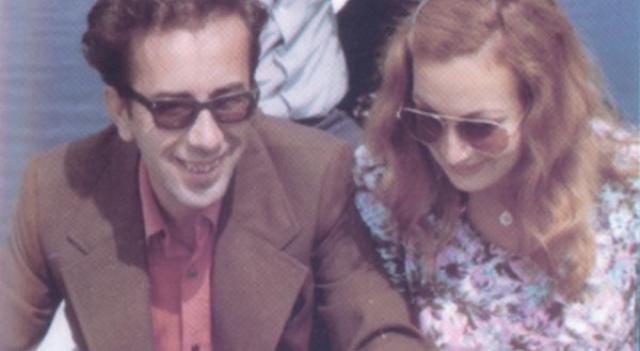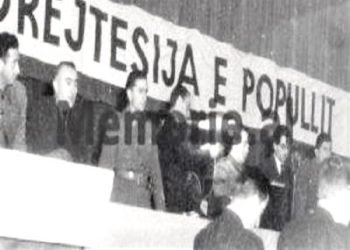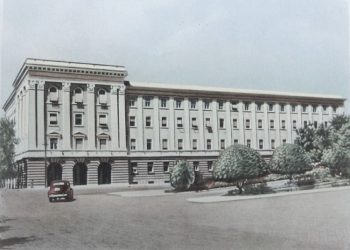By Dashnor Kaloçi
Part Thirty
Memorie.al / Forty-three years ago, at dawn on December 18, 1981, the Albanian Prime Minister Mehmet Shehu, who had held that position since 1953, was found dead in his bedroom (according to the official version, from a “pistol shot”), in the villa where he lived with his family, at the entrance to the “Block” of the high leadership of the Party of Labour, just a few meters from the building of the Central Committee of the Party of Labour and also from the villa of Enver Hoxha, number 31. Even though more than four decades have passed since that day, considered one of the most serious and also most publicized events of that regime, there is still no clear and accurate version regarding what happened to the former Albanian Prime Minister, Mehmet Shehu, on the night before December 18, 1981! However, even after the 1990s, dozens of testimonies and archival documents have been made public regarding that event, “the murder or suicide of Mehmet Shehu,” which continues to be the subject of numerous debates and discussions, further shrouding the truth around it in mystery!
Starting from this fact, in the context of publishing dozens of testimonies and files with archival documents from the secret fund of the former State Security and the Ministry of Internal Affairs, or even the Central Committee of the Party of Labour, which we have published in these three decades after the collapse of Enver Hoxha’s communist regime and that of his successor, Ramiz Alia, Memorie.al has obtained the voluminous file “of the enemy and poly-agent Mehmet Shehu,” which was extracted from the secret fund of the former State Security at the Ministry of Internal Affairs (now declassified and part of the fund of the Authority for the Information of the Documents of the former State Security), where with a few small exceptions, the vast majority of them has never seen the light of publication and is being published for the first time complete with the relevant facsimiles.
In this file, in addition to the testimonies in interrogation from witnesses or defendants, there are also complete the expert reports of the operational-investigative group that was established immediately on the morning of December 18, 1981, led by Koço Josifi (head of the Investigation Directorate of the Ministry of Internal Affairs of Tirana), forensic doctors Dr. Fatos Hartito and Docent Bashkim Çuberi, the Prime Minister’s doctors, Milto Kostaqi and Llesh Rroku, the criminalist expert from the Central Forensic Laboratory of the Ministry of Internal Affairs, Estref Myftari, assisted by high officials from that ministry, Deputy Minister Xhule Çiraku, head of the Investigation Directorate at the Ministry of Internal Affairs Elham Gjika, and the deputy director of the Tirana Directorate of Internal Affairs, Lahedin Bardhi.
This file also contains the testimonies of the family members of the former Prime Minister Mehmet Shehu, service personnel, and his escort group, as well as all the other people who were summoned and testified about that event.
However, even though we are dealing with archival documents, it should be emphasized that knowing how the communist regime operated before the 1990s, we cannot claim absolute truthfulness regarding what is written there, as not only the witnesses and defendants who have given their testimonies, but also some of the investigators of this case (primarily after the 1990s) have made it known that these were obtained under pressure, intimidation, and torture, both physical and psychological, even further, where some of the investigators wrote them themselves, and the witnesses or defendants simply signed them.
Moreover, for some of the defendants in this investigative process, specifically in the case of Fiqret Shehu, the questions were drafted by Enver Hoxha himself (in his handwriting) and were sent to the investigators through the Minister of Internal Affairs, Hekuran Isai (which we have published with the relevant facsimiles in previous writings), and all of this aimed to enable “the discovery of the hostile group of poly-agent Mehmet Shehu,” in order to justify his suicide (according to the official version)!
In this context of the dictator Enver Hoxha’s paranoia, the following individuals were arrested and placed on trial: Kadri Hazbiu (former member of the Political Bureau of the Central Committee of the Party of Labour and Minister of Internal Affairs and Defence), Feçor Shehu (former Director of State Security and Minister of Internal Affairs), Nesi Nase (former Minister of Foreign Affairs), Llambi Ziçishti (former Minister of Health), Llambi Peçini (former head of the Directorate of Protection and Physical Security of the high leadership of the Party of Labour), Elham Gjika (former head of the Investigations of the Ministry of Internal Affairs), Gani Kodra (former head of the Directorate of Protection and Physical Security of the high leadership of the Party of Labour and the family of Mehmet Shehu), Kristofor Martiro (former investigator of the “hostile group of Beqir Balluku”), Ali Çeno (former head of the escort group of Prime Minister Mehmet Shehu), Xhavit Ismailaga (former barber of Hotel “Dajti”), Idriz Seiti (former Colonel of State Security, head of the Departments of Internal Affairs in Kukës and Lezhë, and head of department in the Ministry of Internal Affairs for the protection, security, and execution of anti-party individuals), Lirim Pëllumbi (former head of the Department of Internal Affairs for the district of Durrës), Qamil Mane Islami (former Colonel in the Directorate of Camps and Prisons of the Ministry of Internal Affairs), Duro Shehu (brother of Mehmet Shehu, former commissioner in the Directorate of Military Aviation of the Ministry of Defence), Fiqret Shehu, the wife of Mehmet Shehu, along with their two sons, Bashkimi and Skënderi, etc.
From this “hostile group,” the first four (Kadri Hazbiu, Feçor Shehu, Llambi Ziçishti, and Llambi Peçini) were sentenced to death and executed, while the others received heavy prison sentences, from which they were only released in 1991, with the exception of Fiqret Shehu, who died in prison in 1987, under mysterious and still unresolved circumstances, as well as the eldest son of the Shehu family, Vladimir, who also died under mysterious circumstances still unresolved, in the city of Gramsh (the official version: suicide), where he had been interned with his family in January 1982. For more information about this event, etc., the documents in question provide details, which we are publishing along with the relevant facsimiles and photos.
Continued from the previous issue
MINUTES OF THE INTERROGATION OF LIRIM PËLLUMBI, FORMER DEPUTY DIRECTOR OF STATE SECURITY AND HEAD OF THE INTERNAL AFFAIRS DEPARTMENT OF THE DURRËS DISTRICT, WHO WAS SERVING A SENTENCE OF 10 YEARS OF POLITICAL PRISON, IN SPAÇ, FROM THE INVESTIGATOR OF THE MINISTRY OF INTERNAL AFFAIRS, FLORIAN KOLANECI
MINUTES
(Of the witness interrogation)
Tirana, May 30, 1983
I, Florian Kolaneci, an investigator at the Ministry of Internal Affairs, am interrogating Lirim Ismail Pëllumbi, born in 1943, with a higher education, married, of Albanian nationality and citizenship, sentenced to 10 years of imprisonment, currently serving his sentence in Unit 303 in Spaç, in the capacity of a witness.
The witness has been warned of the legal responsibility he holds under Article 202 of the Penal Code of the People’s Socialist Republic of Albania for giving false testimony.
WITNESS
Lirim Pëllumbi
Regarding what I have been asked, I have to say the following:
From the contradictory conversations and positions that clearly emerge from the above about Feçor Shehu, I understood that he was lying; he had not actually informed the Party. I also emphasize that on the day when we were with the First Secretary, when we went down to Hotel “Adriatic” on the beach to have lunch, I saw Marjeta with her husband and a writer with his wife (Ismail Kadare with Helena, my note), amidst the foreigners, having lunch. I told Feçori to look for himself and be convinced of what I had said in the Party Committee.
He said to me, “I see it, I see it, but there’s nothing we can do”?! – leaving me to understand that even he was wasting time on these matters! On another day in the summer of 1980, Hasan Caslli was explaining to Feçor Shehu that Marjeta Shehu was not quite sane, coming and staying with………….. among the foreigners, and one foreigner had directed a stereo camera towards………… Marjeta, and I was compelled, said Hasani, to go and speak to Marjeta to behave well!
Feçori again replied, “What can we do?!” We also told Feçori once in the summer of 1981 that Mehmet Shehu’s children were cruising all day on a speedboat through the crowd and would probably kill someone someday, pointing with our hands at the speedboat that was speeding through the crowd at that time, but it made no impression on Feçori and he did not respond! From all this, I understood that Feçori liked the lifestyle that Mehmet Shehu’s children were living; therefore, he did not rebel and did not hold a critical stance!
I cannot recall which month it was in 1980 when a seminar was held in Tirana with the heads of the Third Sections. In this seminar, Feçor Shehu had issued an order that the Executive Committees in the districts should be treated as an item of special importance by the Security sector, in order to maintain secrecy and the Committee from the enemy’s attempts. When the head of the Section, Bajram Doçi, came to Durrës, he relayed this order to me; I told him to take a look at this matter, as it falls under the competence of the head of the Department, and there’s no need for an order from above since we remained busy opening files instead of addressing our primary duties.
At the end of August 1980, the complex team from the Ministry came, and one day, Feçor Shehu himself came to inspect the team’s work. I don’t remember who among the team members reported to Feçor that we had not taken the Executive Committee, an item of special importance! Feçori criticized me for not implementing his order; I told him that we had remained busy opening files, instead of focusing on our main tasks! He said to me that this order was given in the seminar, and you have not implemented it, so consider taking the Executive Committee as an item of special importance. With that, the discussion with Feçori ended.
After the team left, I stayed back, and around April-May 1981, when the head of the 8th Department of the First Directorate of State Security arrived and noted that we had not taken the Executive Committee, an item of special importance, he reported it to the Ministry. After this report, Feçor Shehu called me on the phone: “Why haven’t you implemented the order to take the Executive Committee, an item of special importance? It’s just you!” and he gave me a sharp order that after I implemented the order, I should inform him. After this, I accepted the decision, and if I’m not mistaken, we assigned a collaborator to maintain secrecy.
In December 1981, based on a letter from the government, a consultation was held regarding the working method, the fight against bureaucratic manifestations at the department level. Among the discussions was also the topic of taking the Executive Committees as an item of special importance, stating that it was a formal matter. This was also raised during the Security analysis in January 1982.
On January 11, 1982, the delegates present at this analysis reported to Feçor Shehu about this issue, and he (Feçor Shehu) called me three times on the phone, wanting to persuade me that there was nothing wrong with this, as the Platform allows it. I responded that while the Platform might allow it, we raised the issue by delving into the directives of the Political Bureau from January 31, 1981, which stated: “we need to understand our dependence on the organs of power!”
After my insistence, he instructed me to put my opinion in writing so that he could see it, and I elaborated extensively in the concluding report I sent to the ministry in January 1982. I should add that I cannot remember if the written order to take the Executive Committees as items of special importance ever arrived. In August-September 1981, the head of the Eighth Department of the First Directorate of State Security came to Durrës to oversee the formulation of the decision to take the Executive Committees as items of special importance.
However, since we had formulated them correctly, there were no changes made, but he explained to me that “in some districts, the forms were filled out in such a way that they had a smell of Trotskyism, as if the Security was controlling the power, and for these observations, I made a report for Feçor Shehu, and together with the deputy director and the director of the First Directorate, we submitted it to Feçor Shehu, who after reading it, asked: ‘whose idea was it to create this material?’ I told him that it was part of the Department’s plan to see if we made any mistakes from the districts, and in fact, we found many fundamental mistakes.
Feçor addressed me, saying: “where will this material go then?” I told him that after you reviewed it, it would go to the archive; he, heated, said: “you are not thinking straight” and tore the material into four pieces and threw it in front of me, ordering that all the districts should rectify the formulations of the decisions regarding the taking of the Executive Committees as items of special importance, and we acted accordingly.
After Feçor Shehu was dismissed, the deputy minister responsible for Security asked me to reproduce the information that Feçor Shehu had torn up. I did it and sent it to the Central Committee of the Party, and at the instruction of the latter, the measures taken regarding the Executive Committees of the districts were annulled, considering this action as very erroneous and unprincipled on the part of Feçor Shehu!
At the end of 1980, the officer in charge of the port came to Durrës and said that, by the minister’s order, the Customs would be taken as an item of special importance. I opposed it, telling him that of the eight people there, seven were communists; what agency would they set up there, except to control the basic Party organization? Therefore, this cannot be done by order, but should be looked at on a case-by-case basis; for us, this isn’t a problem, and it falls under my authority, not the ministers, so we will not implement it.
He, upon arriving in Tirana, informed Feçor about our opposition, and without asking why we opposed it, Feçor issued a circular order by telegram that Customs should be taken as an item of special importance, and I ordered the head of the port section to take the necessary actions. I do not remember the month when the head of the port section, Flamur Sinoimeri, came to my office, but it was in 1981; he asked me to mobilize all Operational Workers of the Department to carry out biographical verifications of the personnel of the Trade Fleet, about 600 people.
I asked him where this request originated, and he replied: “Dhimitër Bonata (former head of the Ninth Department of the First Directorate of State Security) told me that it was an order from Feçor Shehu.” I told him that the biographical verification for which individuals is clearly defined in the minister’s existing order; thus, if there are thoughts to verify even the sailors of the Fleet, the minister must change the order before we can act; you should not take any action, and Flamur left. This order was reiterated to Flamur by Dhimitër Bonata, and the latter came back to me again.
On January 11, 1982, the delegates present at this analysis reported to Feçor Shehu about this issue, and he (Feçor Shehu) called me three times on the phone, wanting to persuade me that there was nothing wrong with this, as the Platform allows it. I responded that while the Platform might allow it, we raised the issue by delving into the directives of the Political Bureau from January 31, 1981, which stated: “we need to understand our dependence on the organs of power!”
After my insistence, he instructed me to put my opinion in writing so that he could see it, and I elaborated extensively in the concluding report I sent to the ministry in January 1982. I should add that I cannot remember if the written order to take the Executive Committees as items of special importance ever arrived. In August-September 1981, the head of the Eighth Department of the First Directorate of State Security came to Durrës to oversee the formulation of the decision to take the Executive Committees as items of special importance.
However, since we had formulated them correctly, there were no changes made, but he explained to me that “in some districts, the forms were filled out in such a way that they had a smell of Trotskyism, as if the Security was controlling the power, and for these observations, I made a report for Feçor Shehu, and together with the deputy director and the director of the First Directorate, we submitted it to Feçor Shehu, who after reading it, asked: ‘whose idea was it to create this material?’ I told him that it was part of the Department’s plan to see if we made any mistakes from the districts, and in fact, we found many fundamental mistakes.
Feçor addressed me, saying: “where will this material go then?” I told him that after you reviewed it, it would go to the archive; he, heated, said: “you are not thinking straight” and tore the material into four pieces and threw it in front of me, ordering that all the districts should rectify the formulations of the decisions regarding the taking of the Executive Committees as items of special importance, and we acted accordingly.
After Feçor Shehu was dismissed, the deputy minister responsible for Security asked me to reproduce the information that Feçor Shehu had torn up. I did it and sent it to the Central Committee of the Party, and at the instruction of the latter, the measures taken regarding the Executive Committees of the districts were annulled, considering this action as very erroneous and unprincipled on the part of Feçor Shehu!
At the end of 1980, the officer in charge of the port came to Durrës and said that, by the minister’s order, the Customs would be taken as an item of special importance. I opposed it, telling him that of the eight people there, seven were communists; what agency would they set up there, except to control the basic Party organization? Therefore, this cannot be done by order, but should be looked at on a case-by-case basis; for us, this isn’t a problem, and it falls under my authority, not the ministers, so we will not implement it.
He, upon arriving in Tirana, informed Feçor about our opposition, and without asking why we opposed it, Feçor issued a circular order by telegram that Customs should be taken as an item of special importance, and I ordered the head of the port section to take the necessary actions. I do not remember the month when the head of the port section, Flamur Sinoimeri, came to my office, but it was in 1981; he asked me to mobilize all Operational Workers of the Department to carry out biographical verifications of the personnel of the Trade Fleet, about 600 people.
I asked him where this request originated, and he replied: “Dhimitër Bonata (former head of the Ninth Department of the First Directorate of State Security) told me that it was an order from Feçor Shehu.” I told him that the biographical verification for which individuals is clearly defined in the minister’s existing order; thus, if there are thoughts to verify even the sailors of the Fleet, the minister must change the order before we can act; you should not take any action, and Flamur left. This order was reiterated to Flamur by Dhimitër Bonata, and the latter came back to me again.
On January 11, 1982, the Executive Committee of the district dismissed B.K. from work and reported us for criminal prosecution, while the basic Party organization expelled him from the Party. The district Party Committee instructed us to investigate all individuals connected to the theft at the Maritime Works, then we would see how many we would take to court, as it was said that to resolve a matter, one needed to pay a bribe, so we had this case in hand to investigate. As a branch, we had no reason to act differently than what the Party and the authority had done in the district.
At this time, in the presence of Bardhyl Çuçi and Hasan Caslli, Feçor Shehu addressed me and said: “You are left to deal with B.K., see if you have hostile activity in the Party Committee and the Executive Committee of the district.” I told him that we, as a branch, did not know of any hostile activity in these organs that lead us, but if you know it as the Ministry, that is another matter! Feçori fell silent, and after sitting for about five minutes, he set off for Tirana. The moment Feçor Shehu spoke hostilely about the Party Committee and the Executive Committee, Bardhyl and Hasan looked at each other in astonishment, but did not intervene to maintain a stance.
Since the assistant of the Secretary of the Central Committee of the Party for the organs of Internal Affairs came to the Durrës Party Committee on January 4 and 9, 1982, to meet with me regarding several issues I needed to raise with the Party concerning Feçor Shehu, I worried the latter so much that on January 10, 1982, accompanied by Bato Karafili, he came to Hotel “Adriatic” on the beach in Durrës and asked me to meet with them.
I went to the beach with Hasan Caslli, while Bardhyl Çuçi arrived late, almost a quarter of an hour before Feçor was to leave Durrës. When we entered the hotel corridor, Hasan Caslli stepped aside to use the phone, while Feçori, Bato, and I continued on toward the lounge. As we proceeded, Bato asked me: “Are you fishing, Lirim?” I replied that I wasn’t fond of fishing and I didn’t know. We entered the lounge and began to play cards; Feçori, Bato, Hasan, and I; Feçori asked me: “Are you fishing, Lirim?” and then moved on to the next question: “But did the assistant of the Secretary of the Central Committee of the Party come yesterday to Durrës regarding fishing?”
I told him that he had gone to the Party Committee. Then Feçori asked me again: “But yesterday, where were you?” I said that I was in the office, correcting the annual analysis report. He continued: “You were in the office all day?” Yes, I replied. Throughout the entire game, Feçori signaled for cards to Bato Karafili, and Hasan told Feçori: “Don’t signal, as you yourself advised us not to play at cards!” Feçori, looking at me and Bato, expressed: “Oh, how much I have advised, but it depends on how well they understand me!”
The conversation that took place on January 10, 1982, from both Bato and Feçor was filled with subtext. The response he gave to Hasan, as far as I understood, had nothing to do with the signals of the card game, but he aimed somewhere else. I realized that Feçor Shehu, since he did not grasp the truth from me, upon the arrival of the assistant of the Secretary of the Central Committee of the Party in Durrës, let slip the earlier statement, so that Hasan and I would understand (Bardhyl had not arrived yet) that the things he discussed or expressed with us should not be mentioned to the Party! Memorie.al
Witness Investigator
Lirim Pëllumbi Florian Kolaneci
To be continued in the next issue




